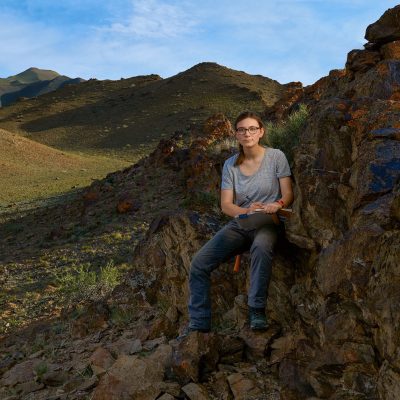Student Spotlight: Olivia Paschall

November 7, 2022
Olivia Paschall is a doctoral student in geological sciences from Hickory, North Carolina. She earned her B.S. in geology from Appalachian State University and now studies a satellite remote sensing tool under the guidance of Rowena Lohman.
What is your area of research and why is it important?
I study a satellite remote sensing tool called InSAR (interferometric synthetic aperture radar), which can measure ground surface deformation over large areas from space, with up to mm-scale precision. InSAR can be used to study many types of deformation like volcano inflation/deflation, slip on faults (earthquakes and fault creep), and anthropogenic deformation like subsidence due to aquifer depletion and hydrothermal fluid extraction. I am working with my advisor, Rowena Lohman, to improve time series processing of ground displacement, because standard processing methods include assumptions that are violated in certain areas. Particularly, soil moisture fluctuations contribute bias to the data that is poorly understood. My work will contribute to improving methods for quantifying surface displacements with higher precision.
What are the larger implications of this research?
Accurately quantifying surface deformation has implications for infrastructure development, volcanic hazard estimation, and land/water use policies. For example, subsidence in the United States affects a combined area roughly equal to Vermont and New Hampshire. About 80% of this subsidence is due to groundwater extraction, and we can measure this deformation with InSAR. Subsidence like this changes over time (drought, seasonal, land use, etc.), so having accurate time series of the deformation is critical to study this subsidence and inform policy decisions. Additionally, an upcoming NASA/ISRO (Indian Space Research Organization) mission (NISAR) is set to launch next year, which will collect more data than any other NASA mission to date. Understanding sources of noise like soil moisture fluctuations to effectively use all this data for many applications of InSAR is increasingly important.
What does it mean to you to have been awarded a National Science Foundation Graduate Research Fellowship?
Being awarded this fellowship is a great privilege and honor. I am so grateful that a committee read my application and felt confident that my education and project are valuable investments and that I can succeed in my chosen field. I appreciated the valuable reviewer comments and I feel validated that my project is worthwhile.
What will this fellowship allow you to do that you might not have otherwise?
This fellowship allows me the independence to work on scientific problems that I am interested in, without being restricted to the projects for which my advisor has funding. This fellowship puts me on a great track to become a successful and independent researcher throughout my graduate studies. I plan to pursue a career as a professor at a primarily undergraduate institution, and the freedom of this fellowship allows me to spend some of my time developing my mentoring and teaching skills as well.
What are your hobbies or interests outside of your research or scholarship?
In addition to research, I enjoy spending quality time with my pet bunny, Pazuzu. I also like sewing (I made my Halloween costume last year; I was the geologic timescale!), and I recently got back into pottery. During the summer, I plan to continue playing softball with the Ithaca Women’s League.
Why did you choose Cornell to pursue your degree?
For me, Cornell was a perfect combination of location, advisor, and department culture. I applied here because I was interested in my advisor’s research, and the more I talked to her students and after attending a virtual visit for prospective students, I was sold. The natural beauty and abundance of activities Ithaca has to offer were just one component. The field of earth and atmospheric sciences is welcoming, supportive, and actively working on improving inclusion and diversity. I love the people I work with, which is important to me, and I feel very lucky to be here.
